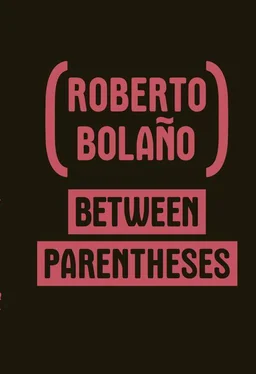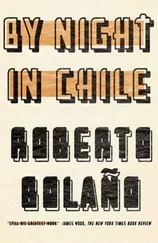Roberto Bolaño - Between Parentheses - Essays, Articles and Speeches, 1998-2003
Здесь есть возможность читать онлайн «Roberto Bolaño - Between Parentheses - Essays, Articles and Speeches, 1998-2003» весь текст электронной книги совершенно бесплатно (целиком полную версию без сокращений). В некоторых случаях можно слушать аудио, скачать через торрент в формате fb2 и присутствует краткое содержание. Год выпуска: 2011, Издательство: New Directions, Жанр: Публицистика, Критика, на английском языке. Описание произведения, (предисловие) а так же отзывы посетителей доступны на портале библиотеки ЛибКат.
- Название:Between Parentheses: Essays, Articles and Speeches, 1998-2003
- Автор:
- Издательство:New Directions
- Жанр:
- Год:2011
- ISBN:нет данных
- Рейтинг книги:4 / 5. Голосов: 1
-
Избранное:Добавить в избранное
- Отзывы:
-
Ваша оценка:
- 80
- 1
- 2
- 3
- 4
- 5
Between Parentheses: Essays, Articles and Speeches, 1998-2003: краткое содержание, описание и аннотация
Предлагаем к чтению аннотацию, описание, краткое содержание или предисловие (зависит от того, что написал сам автор книги «Between Parentheses: Essays, Articles and Speeches, 1998-2003»). Если вы не нашли необходимую информацию о книге — напишите в комментариях, мы постараемся отыскать её.
The Savage Detectives
Between Parenthese
Between Parentheses: Essays, Articles and Speeches, 1998-2003 — читать онлайн бесплатно полную книгу (весь текст) целиком
Ниже представлен текст книги, разбитый по страницам. Система сохранения места последней прочитанной страницы, позволяет с удобством читать онлайн бесплатно книгу «Between Parentheses: Essays, Articles and Speeches, 1998-2003», без необходимости каждый раз заново искать на чём Вы остановились. Поставьте закладку, и сможете в любой момент перейти на страницу, на которой закончили чтение.
Интервал:
Закладка:
Aira is an eccentric, but he’s also one of the three or four best Spanish-language writers alive today.
MEMORIES OF JUAN VILLORO
A new story collection by the Mexican writer Juan Villoro, La casa pierde [The House Loses] (Alfaguara), has just hit the shelves of bookstores in Spain, ten excellent stories invested with Villoro’s rare power not to look into the abyss but to teeter for a long time on its brink, to teeter and thereby make us, his readers, teeter, in a kind of half-sleep or perhaps a state of heightened clarity.
The first time I met Villoro was at the Universidad Autonoma of Mexico, at an awards ceremony. He had received second prize for a short story and I had received third prize for poetry. Villoro was sixteen or seventeen and I was three years older. My memories of that day are mostly hazy. I remember a tall, eager adolescent. I don’t know whether back then he had a beard yet or not, maybe not, although in my mind I see him with a beard, talking to me for a few minutes, neither of us paying much attention to the other, neither of us contemplating the future, a future that was beginning to open up before us, though not like a curtain parting or like a sudden vision but like a metal garage door that rises with a clatter, neither cleanly nor harmoniously. This is it. This is what you’ve been allotted. But we didn’t know that and we talked about the kinds of things young writers talk about. Then more than twenty years went by and not long ago I saw him again. He’s a little taller than he was then, I think, and maybe a little thinner. His stories are much better than they were then; in fact his stories are some of the best written in Spanish today, comparable only to those of the Guatemalan Rodrigo Rey Rosa.
But that isn’t the important thing, I realize, as I watch Villoro gaze at the Mediterranean. Is the important thing that we’re still alive? No, though that counts for something. The important thing is that we have our memories. The important thing is that we can still laugh and not splatter anyone with blood. The important thing is that we’re still standing and we haven’t become cowards or cannibals.
HANNIBAL, BY THOMAS HARRIS
Strange, this novel. It’s a bestseller, intended for a mass audience, but I wish most contemporary novelists wrote this well. Thomas Harris has read the classics of English literature. Dickens, Stevenson, Jane Austen, the Brontë sisters. And he knows how to pace a story. He isn’t a great novelist. He’s a craftsman, but every once in a while it’s nice to read someone who can tackle something long without boring us to death before we get to page fifty. And Hannibal Lecter is a great character. With lapses, purple passages, even soft spots, but ultimately a great character. His views on crime are chaotic. There’s no rhyme or reason to them. But his views on pain and the brevity of life can be magnificent, and they make him a virtuous hero. The secondary characters are at once believable and implausible: in other words, they’re literature. Like ambitious Inspector Pazzi of the Florence Questura, whose fate is anticipated in a Renaissance fresco; or like Carlo, the Sardinian kidnapper who’s always chewing on a deer tooth and who smells like a pigsty; or like Deputy Mogli, gray-haired and corrupt and also brave in his own way; or like Barney, the black nurse and autodidact, a brilliant character who gives us a fuller sense if not of the literature that Harris has stored in his head then of the books from which he has profited and his capacity for observation: the relationship between Barney and Mason Verger’s lesbian sister is sketched with the delicacy and clarity of Vermeer — whose paintings, scattered in museums around the world, Barney wants to see in person at least once in his life. Not to mention Agent Starling, who will always look like Jodie Foster to us, but who in Harris’s dreams is probably prettier than Jodie Foster; or like Mason Verger, millionaire, pederast, martyr, and arch-villain, the only one of Lecter’s victims who survives. At once Lecter’s nemesis and the flip side of the same coin.
MIGUEL CASADO: POET
Miguel Casado, born in 1954, a high school teacher in Toledo, Spain, is one of my favorite poets. A while ago he sent me a poem and a letter. With some trepidation, I’ve finally decided to send you this, he wrote. Then he told me that it was his first poem in a long time. As if he’d forgotten how to write poetry, which isn’t true, though it is a difficult art, and some poets do forget or repeat themselves, or, even worse, repeat other poets. Not Casado. His untitled poem is about a trip from Toledo to Madrid to Málaga, first by bus, then by train, the parched landscape, the Madrid metro where the poet is passed by a black father and son speaking Spanish, the long line of old men who enter a public toilet one by one. All of this takes place as the traveler recalls a conversation he’d had the night before with a friend who’d flown across the Atlantic, and the plane, according to the poet’s friend, went down and the passengers started to scream in the dark, and reality thickened and thus became more real or maybe more true. At some point, the poem mentions a child crying. Elsewhere, the poet gazes out the window of the train on the outskirts of Córdoba, where it’s not sunny either. He says: The trip languishes as if all around it a void had been created. Toward the end, Norman O. Brown is quoted: “Democracy has no monuments. It strikes no medallions. It does not bear the head of a man on its coins. Its true essence is iconoclasm.” The dream, Casado tells us, is collective, even when it’s impossible to say who’s dreaming. Then the train halts to switch tracks, and just there, before it reaches its geographic terminus but having long since reached its creative destination, the poem stops.
THE RAPIER-SHARP PEN OF RODRIGO REY ROSA
I’m an assiduous reader of Rey Rosa, a Guatemalan writer born in 1958 and a tireless traveler through the deserts of Africa and the villages of India when he’s not visiting liquid apartments, at once strange and familiar. A while ago I reread his last collection, Ningún lugar sagrado [No Sacred Place] (Seix Barral, 1998), set mostly in New York City, where Rey Rosa has lived at different times in his life. It’s a book of short stories, of which Rey Rosa is the consummate master, the best of my generation, which happens to include many excellent short-story writers.
Rey Rosa’s prose is methodical and judicious. He doesn’t scorn an occasional flick of the whip — or rather, the distant crack of a whip we never see — or the use of camouflage. Rather than a master of endurance, he’s a shadow, a ray of lightning shooting across the space of normality. His elegance never detracts from his precision. To read him is to learn how to write and also an invitation to the pure delight of letting oneself be carried away by uncanny or fantastic stories. Until recently he lived in Guatemala and he didn’t have his own house: one day he would stay with his mother, another day with his sister, the rest of the time at friends’ houses. One night we talked on the phone for almost two hours: he’d just gotten back from Mali. Now he’s in India, writing a book that he doesn’t know whether he’ll finish or not. That’s how I like to imagine him: with no fixed address, fearless, checking in to cheap hotels, sitting at bus stations in the tropics or in chaotic airports with his laptop or a blue notebook into which his curiosity — his entomologist’s boldness — calmly unspools.
To some, this prose — especially that of the stories of Ningún lugar sagrado — seems cold, and it probably is: a giant freezer room where words pop, alive, reborn. And then one can’t help but think about the terror unleashed in Guatemala, the depravity and the bloodshed. And one thinks about Miguel Ángel Asturias, Augusto Monterroso, and now Rodrigo Rey Rosa, three giant writers from a small, unhappy country. And the vision that lingers in the mirror is terrible, and it’s alive.
Читать дальшеИнтервал:
Закладка:
Похожие книги на «Between Parentheses: Essays, Articles and Speeches, 1998-2003»
Представляем Вашему вниманию похожие книги на «Between Parentheses: Essays, Articles and Speeches, 1998-2003» списком для выбора. Мы отобрали схожую по названию и смыслу литературу в надежде предоставить читателям больше вариантов отыскать новые, интересные, ещё непрочитанные произведения.
Обсуждение, отзывы о книге «Between Parentheses: Essays, Articles and Speeches, 1998-2003» и просто собственные мнения читателей. Оставьте ваши комментарии, напишите, что Вы думаете о произведении, его смысле или главных героях. Укажите что конкретно понравилось, а что нет, и почему Вы так считаете.












